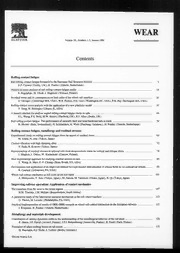
Wear: An International Journal on the Science and Technology of Friction, Lubrication and Wear 1996: Vol 191 Table of Contents PDF
Preview Wear: An International Journal on the Science and Technology of Friction, Lubrication and Wear 1996: Vol 191 Table of Contents
Volume 191, Numbers 1-2, January 1996 Contents Rolling contact fatigue Rail rolling contact fatigue Research by the European Rail Research Institute D.F. Cannon (Derby, UK), H. Pradier (Utrecht, Netherlands) Numerical stress analysis of rail rolling contact fatigue cracks S. Bogdariski, M. Olzak, J. Stupnicki (Warsaw, Poland) Residual stress and its consequences on both sides of the wheel-rail interface O. Orringer (Cambridge MA, USA), W.R. Paxton, D.E. Gray (Washington DC, USA), P.K. Raj (Burlington MA, USA) Rolling contact stress analysis with the application of a new plasticity model Y. Jiang, H. Sehitoglu (Urbana, IL, USA) A branch criterion for shallow angled rolling contact fatigue cracks in rails S.L. Wong, P.E. Bold, M.W. Brown (Sheffield, UK), R.J. Allen (Derby, UK) Rail rolling contact fatigue. The performance of naturally hard and head-hardened rails in track H. Muster (Bern, Switzerland), H. Schmedders, K. Wick (Duisburg, Germany), H. Pradier (Utrecht, Netherlands) Rolling contact fatigue, metallurgy and residual stresses Experimental study on rolling contact fatigue from the aspect of residual stress M. Ishida, N. Abe (Tokyo, Japan) Contact vibration with high damping alloy Y. Suda, H. Komine (Tokyo, Japan) Reconstruction of residual stresses in railroad rails from measurements made on vertical and oblique slices J. Magiera, J. Orkisz, W. Karmowski (Cracow, Poland) New experimental approach for studying residual stresses in rails Y. Wang, X. Shen, F.-P. Chiang (Stony Brook, NY, USA) Development and application of an improved method for experimental determination of release fields in cut railroad car wheels R. Czarnek (Johnstown, PA, USA) Wheel-rail contact mechanics at full scale on the test stand A. Matsumoto, Y. Sato (Tokyo, Japan), M. Nakata, M. Tanimoto (Osaka, Japan), K. Qi (Tokyo, Japan) Improving railway operation: Application of contact mechanics The transition from the wear to the stress regime H.M. Tournay, J.M. Mulder (Braamfontein, South Africa) A parametric study of the lubrication transport mechanism at the rail-wheel interface G. Thelen, M. Lovette (Philadelphia, PA, USA) Practical implementation of results of ORE-ERRI research on wheel-rail contact interaction on the European railways I. Korpanec, H. Pradier (Utrecht, Netherlands) Metallurgy and materials development Contribution of railway dynamics codes to the understanding of the metallurgical behavior of the rail tread P. Aknin, J.P. Pascal (Arcueil, France), J.P.J. Bettembourg (Amneville, France), B. Prasil (Paris, France) Formation of white-etching layers on rail treads G. Baumann, H.J. Fecht, S. Liebelt (Berlin, Germany) Elsevier Science S.A. Viii Contents Metallurgical investigation of transverse defects in worn rails in service K. Sugino, H. Kageyama, T. Kuroki, C. Urashima (Kitakyushu, Japan), A. Kikuchi (Futtsu, Japan) Corrugation and noise Short wavelength rail corrugation: field trials and measuring technology S.L. Grassie (Cambridge, UK) An extended linear model for the prediction of short pitch corrugation K. Hempelmann, K. Knothe (Berlin, Germany) Problems and solutions Tribological aspects of wheel-rail contact: a review of recent experimental research P. Clayton (Portland, OR, USA) Wheel-rail noise: impact, random, corrugation and tonal noise J.J. Kalker, F. Périard (Delft, Netherlands) Reconstruction of residual stresses in railroad vehicle wheels based on enhanced saw cut measurements, formulation and benchmark J. Orkisz (Cracow, Poland), A. Skrzat (Rzeszow, Poland) Cause, increase, diagnosis, countermeasures and elimination of Shinkansen shelling K. Kondo, K. Yoroizaka, Y. Sato (Tokyo, Japan) Effects of wheel-rail contact geometry on wheel set steering forces S. Mace, R. Pena, N. Wilson (Pueblo, CO, USA), D. DiBrito (Silverthorne, CO, USA) Adhesion, wear and lubrication Tribological interrelationship of seasonal fluctuations of freight car wheel wear, contact fatigue shelling and composition brakeshoe consumption J. Kalousek, E. Magel (Vancouver, Canada), J. Strasser, W.N. Caldwell, G. Kanevsky (Saint-Laurent, Quebec, Canada), B. Blevins (Montreal, Quebec, Canada) Fundamental studies in wheel-rail contact problems Elastic—plastic rolling—sliding contact on a quarter space C.-C. Yu, L.M. Keer, B. Moran (Evanston, IL, USA) Effect of overlapping wheel passages on residual stress in rail corners T.N. Farris (West Lafayette, IN, USA) Calculations of the frictional heating of a locomotive wheel attending rolling plus sliding V. Gupta, G.T. Hahn, P.C. Bastias, C.A. Rubin (Nashville, TN, USA) Corrugation, wear and wheel-rail contact problems A fast non-steady state creep force model based on the simplified theory Z. Shen, Z. Li (Chengdu Sichuan, P.R. China) Measurement of railhead longitudinal profiles: a comparison of different techniques S.L. Grassie (Cambridge, UK) A case study of the effect of lubrication and profile grinding on low rail roll-over derailments at CSX transportation D. Rippeth (Jacksonville, FL, USA), J. Kalousek (Vancouver, BC, Canada), J. Simmons (Minneapolis, MN, USA) Shakedown limits in rolling—sliding point contacts on an anisotropic half-space A. Kapoor (Leicester, UK), J.A. Williams (Cambridge, UK) Energy and wear analysis in lubricated sliding Contact ...............seseeseceeeeees PTT ECE PEE PRS | PO ECT RECT Ere A. Alp, A. Erdemir (Argonne, IL, USA), S. Kumar (Chicago, IL, USA) The publisher encourages the submission of articles in electronic form thus saving time and avoiding rekeying errors. A leaflet describing our requirements is available from the publisher upon request.
